
 previous. next. search. recycle. map. current.
previous. next. search. recycle. map. current.
notes quotes provocations and other fair use conversational drift, informatic license, exquisite enclaves by jouke kleerebezem
#777777 grey entries are subject to editorial scrutiny and liable to change
the nqpaofu.com portal daily annotates this weblog's updates and accesses its archive, lemoulindumerle.com and idie.net
3 October 2000
closed, out, sick
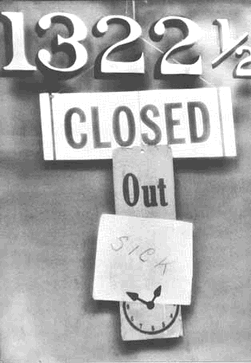
photographer Lee Boltin, from 'JAIL KEYS MADE HERE and other signs', 1959. 'Closed' was taken in San Francisco. Published by Meridian Books, New York. Back cover text: 'PUBLISHERS INVITATION: Meridian Books wishes to enlist the aid of perceptive eyes across the nation (indeed, the world) to help collect more examples of communication gone awry for a sequel volume to be published under Mr. Boltin's editorship. Send photographs, with stamped return envelope, to Mr. Lee Boltin, Meridian Books Inc., 12 E 22 Street, New York 10, N.Y. Any photograph used will be properly credited and a fee of $5.00 paid.'
30 September-1 October 2000
the end of context as we know it, part 2, OR, what else is new? Love, Hate, Capital, Intelligence, License, Morals, Isolation, Transaction, Imperatives, Politics, Articulation And Other Contemporary Heresies Vigorously Incarnating As Pleasing Truths In The Outside World... While Their Information Templates Are Still In Their Infancy And Will Never Handle The Traffic Anyway. Respect. Real.
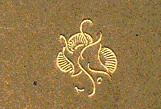 (original size)
(original size)
gold embossed ornament ('butterfly') on the cardboard cover of the 1909 (4th) edition of painter James McNeill Whistler's The Gentle Art of Making Enemies, first printed in 1890, in the author's lay-out (making it a classic of dilettante typography), and with his illuminations: hundreds of tiny butterflyesque ornaments, which also are used all along the 335 pages of the book, as his signature. Talking back to the media:
- Sir,—You, who are, I perceive, in your present brilliant incarnation, an undaunted and undulled pursuer of pleasing truths, listen, I pray you, while again I indicate, with sweet argument, the alternative of the bewildered one.
(originally published in the Sunday Times, 15 January 1888)
context built the cat
Some simple points should be made today. Art and politics' lame relationship, as described before yesterday, is an issue that we have to rid ourselves of, almost ritually, ever once in a while. Especially if contemporary themes provide no relativization of the personal, of the biography, of the commitment imperative and a must-link-the-outside-world paralyzes cultural (and social/political!) imagination—as so much has been a trend in the (visual) arts since the 1990s, and particularly is big in the Netherlands, rooting in a long desireless Calvinist tradition, ultimately in the shape of art as a public service. On a larger scale, then, we have everything PC, and also that thematic dead-end has to be violently nuanced from time to time, because when this naughtiest of all professionalisms is applied to cultural production, it suffocates critical diversity, ipse facto, since fresh looks at how art works (yes it does!) won't emerge from behind a thematic monstrosity as is political correctness, the popular way.
- La vie collective est en train d'écraser la vie individuelle et plus grand est le nombre des individus assemblés et assujetis par les liaisons des besoins, des conventions et coercitions 'sociales', plus l'individu est diminué.
(Paul Valéry, 'Les Principes d'an-archie pure et appliquée', 1936-1938) ('Collectivity is crushing individual life, and the larger the number of individuals who are gathered and subjugated to linked needs, conventions and 'social' coercion, the more the individual is diminished.')
Meanwhile, where did context go? Its full craze started with the advent of the Postmodern sentiment when, upon leaving linear progress, we cheered goodbye to the autonomy of object, author and text, to relativize all entities in the environment of their conception and (sustained?) presence, whether academia or bohemia, Context was King. With the hypertextual web the public began to get used to text and images with links embedded (and marked) in them. I've often wondered what kind of sensation it must have been, the first hands-on experience, to the average book lover or couch potato, to use a mouse and point and click a screen, without having heard or read much about it beforehand. I remember an incredible voyage (even to a computer user, in 1992, 1993?), being explained, hopping from one university computer to another using gopher—and had no imagination of it. Later, my first amazement at MUDs. It's only a few years back, but it is easier framed when remembered as '20th century'. The century which gave birth to context. Context which built our every relation to any object. How very 20th century, indeed.
les thèmes se répètent
The return of thematic interest is by itself a degeneration from individual intelligence. It is an emergency measure, thought to protect against societal disintegration and ultimately consumer amok. It projects consensus where there's none. It is comparing apples and oranges, cats and penguins. Who wants to share? Who wants to share what? Not those debilitating themes (community, interaction, design, business, um... life). On the basis of what kind of understanding would we share interests? My world is different from yours. In every detail. We share (web) space (sometimes), time (at some specific occasions/events/locations), information (tons), interpretation (none), meaning (a little, if we're lucky). Which is all fine politics to me, but still doesn't make my context also your context. When I follow a link from site A to site B, I do this in a completely different expectation/anticipation from yours, if you follow that same link. We share a link, but not a context. My reasons to hit 'back' are not the same as your reasons to hit 'back'. Our eyes haven't gone over the same information before we decide to go 'back'. When hitting 'back', we even do not re-enter the same site of departure, only the same URL... Even if we might share some themes, some links and some information, we do not ever share a context—because there's none left in these media!
Context disappears proportional to the amount of links embedded in a piece of information. If a picture or a 1000 words contain a 1000 links, context for that picture or 1000 words is lost a 1000 times. Ad infinitum. It's new media's mesjuga shower of shot. Themes are called to the rescue, to fake context. If we go by the themes, the information revolution will be lost a thousand times.
may a thousand times a thousand contexts blossom
Informatic culture reduces the context to the individual user/consumer/citizen and her or his sustainable personal relationships—if s/he so manages to maintain some. By herself or himself s/he might as well be connected a thousand times a thousand times, and be proportionally confused. If s/he doesn't want to lose it all (vital information) to automated databases and corporate consensus edutainment or other in any sense of the word unreliable sources—more importantly, if s/he wants to keep up a face on the web as an information producer, since s/he needs to interact from a cultural or any other societal production—s/he then shall construct a strong sustainable identity out of whatever will be the appropriate building blocks (Love, Hate, Capital, Intelligence, License, Morals, Isolation, Transaction, Imperatives, Politics, Articulation... all could do). Any old identity can do. As a matter of fact any old identity is still alive, the older even the more so.
Ah... building sustainable personal relationships is the oldest of community making skills, the oldest of context making skills. Plus ça change... Why I rely on a few weblogs and some old books and art works and music and some tired ideas on utopia for my world view, is entirely my mistake. Mea Maxima Culpa. Enjoy!
more meanwhile
Today marks our 18 month anniversary stay at the Moulin. We will celebrate at the Ferme de la Bussière: Dimanche 1er octobre: 4ème Foire Nature. Vente et échange de produits du jardin et d'animaux de basse-cour. Artisanat—vente de produits biologiques et naturels. Concours du Légume ou du Fruit le plus original. Casse-Croûte, Buvette et Boudin Chaud.
more context
- Sir,—You, who are, I perceive, in your present brilliant incarnation, an undaunted and undulled pursuer of pleasing truths, listen, I pray you, while again I indicate, with sweet argument, the alternative of the bewildered one.
(...)
Let the gentleman be warned—let him learn that the foolish critic only _looks_ and brings disaster upon his paper—the safe and well conducted one "informs himself."
(Painter James McNeill Whistler addressing his art critics and their editors in the Sunday Times, 15 January 1888)
meanwhile, last night
I rotated the salon 90° CW. There. It looks even bigger now.
29 September 2000
context killed the penguin
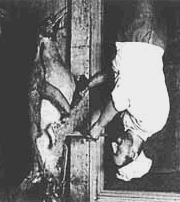
cook on board the Endurance skinning a penguin (upside down)
the fitting game
In our continued series of 'rubbing the context back into ourselves', another helpless scene. When years ago Paul and I visited the missionary museum, we saw this remarkable collection of oddities that had been sent home from the tropics, the Netherlands' colonies, now Indonesia. Imagine opening the crates and for the first time looking into these huge jars filled with lizards, snakes, frogs, pickled for transport. Most remained untouched after initial inspection. Not however this one stuffed chimp(?), who ended up with arms twice their natural length, due to some misinterpretation on the side of the uninformed taxidermist. Exotics pieced back together again in the blind.
However we fit the pieces, we'll take any resulting reality for granted.
28 September 2000
more antidotal reading tonight
1) Paul Valéry, "Les Principes d'an-archie pure et appliquée". On society making:
- Liberté, Egalité, ces deux principes se nuisent ('freedom, equality, these principles harm each other'), and: 'une économie n'est pas une societé' (an economy is no society).
2) José Ortega Y Gasset, "Meditations on Quixote". In the footnotes, this reference and quote from de Unamuno's 'The Tragic Sense of Life':
- In order to understand something, one must kill it, make it rigid in the mind... How, then, can reason be opened to the revelation of life? It is a tragic struggle, it is the essence of tragedy, the struggle of life with reason. And truth? Does one live or does one comprehend? (my italics, JK)
meanwhile...
Here, when it rains, it rains. The sky turns yellow and the next minute: blam, you're soaked. Unless you stare over your desktop pondering where to find support for art's helpless merciless impact, a truth we all experience at some point. Since I ranted 3 mails an hour with QS Serafijn early this morning (before going to bed), Marcel Broodthaers springs to mind, who on his first invitation to an exhibition of his plastered over unsold 'Pense-bête' poetry volumes, noted:
- I, too, wondered whether I could not sell something and succeed in life. For some time I had been no good at anything. I am forty years old...
The idea of inventing something insincere finally crossed my mind and I set to work straightaway. At the end of three months I showed what I had produced to Philippe Edouard Toussaint, the owner of the Galerie St. Laurent. 'But it is art' he said 'and I will willingly exhibit all of it.' 'Agreed' I replied. If I sell something , he takes 30%. It seems these are the usual conditions, some galleries take 75%.
What is it? In fact it is objects.
27-28 September 2000
the end of context as we know it, part 1
disclaimer: everything of value is helpless ('alles van waarde is weerloos', Lucebert, Dutch poet and draughtsman)
'Those who want to be correct in the face of politics, all raise your right hand, please.'
Artists won't inherit the earth, and shouldn't aim to do so. They would spoil whatever politics in no time, installing feudal meritocracy and whatnot. Certainly no anarchy would spring from their rule. Their traditional position 'outside' most immediate contexts in which society could be fabricated—at the level of the everyday as well as at the level of (political) institutions—art outside the political 'habit' acting both at the gut level of the street, as at the (often more banal, but at the same time, by consensus, 'law making') level of government, and capital; outside those direct powers, the ex-centric per se position of symbolic utterance, its fundamental an-archy, makes the artist unfit for any direct/ed political action, or formal political opinion for that matter. Artistic license first and foremost protects the artist from what (politics) (s)he wants.
Art doesn't (ap)prove (of) politics. Like for every citizen in a traditional western democracy, any societal viewpoint the artist is inclined to, gives her or him the exact same responsibilities and (lack of) possibilities, of civic expression, one vote fits all. Yet, 'art as politics' means propaganda, worse than straight disinformation from the political apparatus. If society forgets the golden rule of symbolic utterance, artists end up burning at the stake—'like any ol' minority in the way of power', I'd love to add rhetorically, but analogy doesn't make the point, as any artist should know. If artists themselves forget the golden rule of symbolic utterance, when they venture outside the work, into the politics, they bring down their license. Art doesn't fabricate society. As soon as the (highly culturally dependent, within the context in which the art is produced and presented) balance between the art and its driving forces and ideas can be explained outside the art work, notably as a political view, the artist is in deep trouble (artistically already since form and content are being separated), since the ideas and sentiments which (s)he struggles with (beforehand, as in the act of making, as in the finishing and presenting of the art work), always appear to be in their naked dismantled form—abject, inviting to be thrown off their pedestal, and trampled over by hordes of disappointed users—for whatever deaf and dumb reason (and these can be plenty), as is decided in the strict cultural context, driven by the (in)tolerance du jour. Art as politics, as content outside form, is just like the author being mistaken for his personage: a result of sentimental confusion, populist interpretation, false politics, and other uninformed opinions.
artistic drift never protects the artist from what (s)he wants, ever
Artists' personal anxieties feed their art and, by popular interpretation, increasingly their public image. Biographical egalitarianism kills reputations in all fields of culture, science, politics and business. Hysterical correctness makes an offender out of all of us. Double morality aims straight at the most visible first, so those in the media get the first blows, but since, for the sake of commercial volume, in a medialized, informationalized society all will be equally visible, the witch-hunt can begin. Where do you hope to be at that inevitable point? Over at whatever highly priced correct tendency side, shooting your own rounds of self-congratulatory moralism, or caught in the media mob rule spotlight, tarred and feathered as an intellectual masturbator, or rather imprisoned in whatever splendid isolation current concepts of symbolic industry erect to control those like you: or worse, what if there's no fucking choice, or escape, from the new polis? Who's planning to raise their right hands now?
Artistic license guaranteed environmental tolerance only, as long as the art resulting could (within the strictest of irrational limits) legitimize its dark origins, even if the work could be followed back to the most confused of personal inspirations, from a temper, talent and experience no one 'art lover' cultural type would envy for a moment, but happily gathers the cultural capital that grows around it. Let's be realistic then, and fair, for a change: like the artistic license shield around the arts, there's other kinds of equally secure licenses around other societal discourses. What about academic license, political license, religious license, military license, capital license, generation license, gender license, race license, nation state license, brand license, sport license, biological license—all developed and propagated for protection of a producer, at the price of a product, in and with which society proceeds, by itself protected from being exposed to most of the harmful raw material which constitute the cultural, scientific, political and business commodities that result from above licensed industries, with which we all love to furnish our lives.
Commodities became the prime consumer contexts that got us where we are today. They are under constant debate, in societal discourse which largely shaped them. Holes are shot in licenses all the time. But never before in history, I believe, they have been carpet bombed like since the information industry took over reign. Not simply licenses fall all around us: whole contexts are blown to shreds, dragging down entire belief systems. It is the end of contexts as we know them, and we cannot choose yet (how) to celebrate, or mourn what will come next, and is rapidly installing: the contextless, vulnerable, personal, political After License.
(to be continued: 'context built the cat')
26 September 2000
re-action towards new standards in life activities
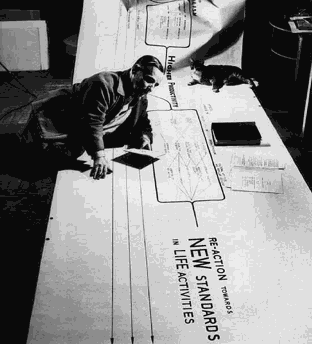
artist attention: Friedrich Kiesler and cat on Correalism table
correct artistry
In the bundle 'Modernism, Criticism, Realism' (1984), Walter Benjamin is quoted in "Author and Producer Revisited", by Art and Language:
'What matters (...) is the exemplary character of production, which is able first to induce other producers to produce, and second to put an improved apparatus at their disposal. And this apparatus is better the more consumers it is able to turn into producers, that is, readers or spectators into collaborators... (from his lecture 'The Author as Producer', held April 1934 at the Institute for the Study of Fascism in Paris)
How do we improve today's apparatus?
Benjamin's lecture evolved around the impossibility of a sine qua non politically oriented 'socialist writer'. To Benjamin, 'a political tendency is the necessary, never the sufficient condition of the organizing function of the work'. Since: 'the work of the author who has reflected deeply on the conditions of the present-day production will never be merely work on products but always, at the same time, on the means of production.'
otherwise
"The abundant commodity stands for the total breach in the organic growth of social needs. Its mechanical accumulation liberates unlimited artificiality, in the face of which living desire is helpless. The cumulative power of independent artificiality sows everywhere the falsification of social life."
(from: Guy Debord, The Society of the Spectacle)
meanwhile around the Moulin
We spotted the first blue tits in the garden.
NQPAOFU archive issues 1-33: finished anchoring
...ok, so much for RSI, I'm kinda cramped after this exercise. But now you can hit into any anchored item of the past 2.5 years of NQPAOFU, from the indexed titles, which is now a 130+k file and shall split up soon -- per year, I guess? C'est pas évident, like we say here...
now playing
Yma Sumac 'Mambo'. Later, Ozric Tentacles' 'Jurassic Shift'.
25 September 2000
urgency

- There is a type of love which feels like a sort of happiness, an attraction, a pull ... and then there is love which feels undeniable, like it is taking over your whole body and soul, like a tidal wave, like the unstoppable, where one has no choice, it is very much akin to being doomed. One is doomed in such love --- no conscious movement
can stop it, although one might try to suppress it or kill it, but nevertheless it keeps coming back, with the message: if you pretend to ignore me then you ignore something bigger than your own life. I don't think everyone always feels this when they fall in love, and I don't feel all love must be this way, but it is worth remembering that this sort of love can happen to you, and it can wash away everything else. This sort of love is not something or someone you choose, but rather it chooses you, for its own purposes and to serve its own mysterious ends. This sort of love comes up on me unexpectedly, unbidden.
(Mitsu Hadeishi, synthetic zero, 23 September)
- The word "love" seems so inadequate, when I think about it. There is such intense variety of love, and it seems to have flavors and sounds and colors and aromas and that's just the tip of the iceberg. Each love seems to be unique, so much so that using one word to cover it all just seems woefully inadequate. There ought to be a richer language for expressing the vastness of the spaces and dynamics of love. The single word makes it hard to talk about, like the reduced dictionary of Newspeak. Perhaps it would be useful to invent new
language for the many kinds of love, the many varieties; not only new words, but ways of speaking, in a living fashion of course: one can never exhaust the possibilities of expression. But even having some more options would be interesting. One could tell a story, for example, about a particular type of love, and then use the title to refer to this kind of love, etc.
(Mitsu Hadeishi, synthetic zero, 28 September)
20 September 2000
my copy

"Ich hab' Mein Sach' auf Nichts gestellt" (1844)
Antje von Graevenitz sent it to me as a present. I received it by mail, 22 May 1985. The same mail contained a notification by the Groningen public library, to inform me that 'Max Stirner, Der Einzige und sein Eigentum' which I had requested, had arrived and was waiting for me at their desk. Antje thought it would interest me after she had read some of my texts which she compiled for a publication of Dutch artists' writing (lost that little precious item?). The only other occasion I received a book from someone upon reading my writing, was when my dad sent me Paul Valéry's Monsieur Teste. In French, bien sûr.
meanwhile around the Moulin du Merle
I'm shocked every time, at the sudden violent change of weather as it occurs in the valley: late yesterday afternoon, after a very brilliant and warm day, wind got up, sweeping the garden and bringing rain, sending us after our tools and whatnot, hurrying to close the windows and shutters, Total changement de décor in no time.
19 September 2000
against interaction (automation, deus ex database)

what I was hoping to write about
Some observations that did not lead to anything coherent, yet (see below).
- with current web publications, most 'user interaction' is limited to his or her following links that serve as footnotes, illustrations, examples with the document that they are linked from
- 90+% of current web publications is ephemeral and not structured, edited or designed to last as reference—click fodder...
- how would we organise (write/illustrate, present, store) our content, if we did not take the book/library as our format example, but the search engine (!PS 20 September: today this question got miraculously answered in some googly way) (see also 'more is less' or 'search rocks')
- if 'searching' is optimized, which structural principles will we order our publications after? We're not turning pages here, in a quiet corner of the library. Would optimized searchability maybe allow us to concentrate on the organization of a production, instead of the organization of reception? Do I finally get my editing software which edits/allocates my paragraphs so to 1) relate relevant text and image items, with disregard of when they were added, or 'where' they are on my hard disk (web server), while giving me full insight in how and why the bits go together, and 2) will all these fragments be browsable along interest based questioning? Will my documents re-arrange on the fly, rather than be presented in a list of n clicks, in n documents, all containing the words 'produce present learn', oid?
and what I ended up writing
retreat from the library
We recklessly retreat from the proven orders of the library and the museum, the page and the object, for other structures and systems of storage, ordering and representation of our knowledge and esprit. The Internet and web proudly but mischievously flag the names of previous knowledge systems (site, page, button) and are designed after card catalogues (down with tabs now!) and corporate brochures, while otherwise having nothing in common with these media, in how they contain texts and images and what kind of access they facilitate. So? Are those pioneering the new media, at the benefit and coming from a production which would previously have had its realization in print or material fabrication, actually forging alternative presentation and access, on the basis of new technological affordances? I'm afraid not. Let alone a new literary or artistic genre would emerge, fundamentally different from a printed illustrated book, a daily newspaper, a video or film production, painting or sculpture—and their content, which was as diverse and rich as you can only imagine, always. For a content not less rich, should we negotiate new forms of presentation and retrieval, as being art and part of contemporary cultural production?
clickpath convulsion
Default use of the popular web has been defined as publishing, not collaboration or resource sharing. If we take this for a fact for now, we see that its native publications consist of 90+% ephemera. No paper based format should dare try to beat these figures. Late-capitalist industries need infinite volume and fast, continuous renewal. These demands are optimaly met in the services and commerces using the web, and ever expanded with new communication technologies, at wap warp speed. The populace happily clicks through its new universes, closely monitored by the 'content' industries, who work overtime to gather and process data which will improve their anticipation of consumer habits and interests.
Industry developments have never supported cultural production of another, slightly bigger ambition: lasting, intelligent, insightful, imaginative, elaborate, concentrated expression—other than by the rare whim of individual patron captains, who blew fortunes on art collections, their conservation, research and institutionalization. As with government support, this also seems a fading habit. I know of no impressive investments in high profile alternative new media research, but would be happy to be introduced to some. On the other hand, contemporary artistry might be slow in its demands, too much relying on traditional hierarchies of patronage and economical support.
what's holding back new lit order?
Is contemporary content still best served with existing orders of publishing, when applied to new media: the issue, the page, the footnote, regular periodicity etc., simply benefiting the low cost and easy production, distribution and access of new formats? Might it still be too comfortable with existing modes of recompensation? Of course the rogue charm of the web was in the phenomenal unpaid growth in its early years, when most of the content which is still part of the 'best of the web' was initiated in the hands of eager adopters.
(...)
still playing
Ultra Naté, 'Blue Notes In The Basement', 1991, "(Your Love's A) Scandal"
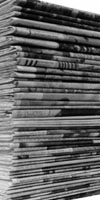
NQPAOFU 26, 20 March 2000


 (original size)
(original size)





